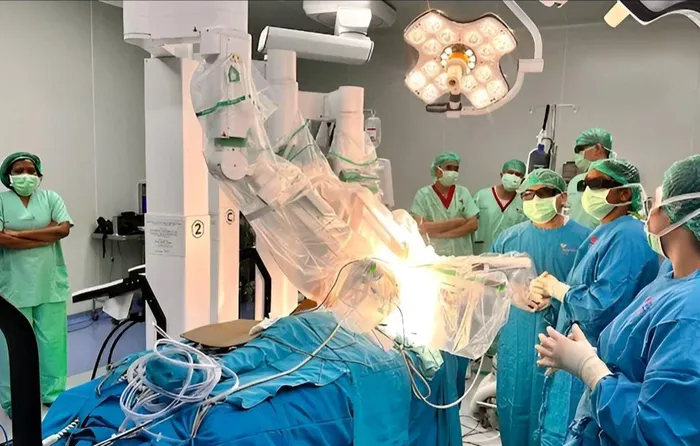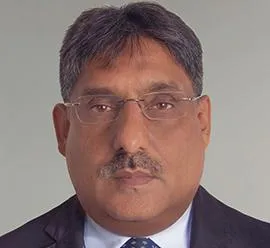
India’s first Made-in-India Surgical Robot - the SSI Mantra - developed by SS Innovation, was installed in Pune's Noble Hospital last year. The tech was designed to make surgeries smoother, safer, and precise.
Image: LinkedIn
A TAXI pulls up in Mumbai with no driver, trains glide at 350km/h without conductors, cargo planes cross continents with empty cockpits, and surgeons in Seoul perform heart surgery on patients 500km kilometres away using robotic hands.
This isn't science fiction - it's Tuesday morning in Asia.
While America scrambles to catch up and Britain debates regulations, the real AI revolution is happening in the East. The question burning in every South African mind should be: are we watching the future unfold, or are we about to become its casualties?
- India's Digital Dominance
Remember when the world mocked India's "jugaad" innovation? They're not laughing anymore. Indian AI companies are now making Silicon Valley executives lose sleep.
Bangalore's Ola deploys self-driving rickshaws navigating impossible traffic while Tesla's cars still need human intervention. Indian AI doctors perform remote surgeries - specialists in Delhi operating on rural patients using robotic arms from hundreds of miles away. Practo's radiologists use AI to read X-rays for patients across three continents while they sleep. Meanwhile, Britain's NHS runs on fax machines where patients wait months to see human doctors.
India's UPI system processes more digital transactions than the US and Europe combined, working seamlessly for village farmers and Delhi CEOs in 22 languages.
- China's calculated conquest
China operates 40 000km networks of driverless high-speed trains that never miss schedules while managing traffic lights and cargo flows without human intervention. JD.com's AI drones deliver dinner to apartment balconies faster than couriers can climb stairs - while Amazon's program remains stuck in regulatory red tape.
Most terrifying for Western generals: Chinese military drones make autonomous kill decisions. While American pilots remotely control drones from Nevada bunkers, Chinese AI coordinates battlefield tactics and attack strategies without human oversight. Most terrifying for the West? China's AI can now design new AI systems faster than human programmers. They're not just competing in the AI race - they're changing the rules entirely.
Silicon Valley spent billions on ChatGPT demos that impress conferences but struggle with real problems. Tesla promises fully self-driving cars "next year" (for the eighth year running), while Chinese passengers commute in autonomous vehicles daily. Britain debates "ethical frameworks" while their NHS can't digitise records and trains need human drivers. The brutal truth: while the west debated, the east delivered everyday AI miracles.
South Africa will never lead the global AI race - that ship sailed during load shedding debates. But we face a more urgent question: will we catch up fast enough to remain relevant, or become a digital colony dependent on foreign AI masters?
We have shocking successes most South Africans don't know about: Cape Town's Aerobatics uses AI drones spotting crop diseases with 95% accuracy - technology so advanced that Australian and European farmers buy it from us. Discovery Bank's AI protects 2.5 million accounts with fraud detection rivalling Silicon Valley. In 2024 alone, Microsoft trained 150 000 South Africans in AI skills - more than many European countries combined.
India managed their 2024 elections using 1.5 million electronic voting machines and AI systems connecting with voters in multiple languages - we still count paper ballots by hand and argue about results for weeks.
India's Operation Sindoor demonstrated AI-powered military precision with integrated command systems detecting hostile objects with millimetre accuracy - meanwhile, our defence force deteriorates so badly that tiny Lesotho now claims territorial rights to Free State and KwaZulu-Natal provinces.
While global focus remains on domestic political narratives that emphasise external challenges and historical grievances, the real threat to our future prosperity emerges from technological obsolescence. We could deploy AI to monitor CCTV networks, patrol our coastlines, secure government infrastructure, detect municipal service failures, and prevent water system disasters before they occur.
Yet institutional resistance persists, rooted in a mindset that assumes South African exceptionalism and external obligation rather than embracing global collaboration. This technological isolationism doesn't merely delay progress - it systematically weakens our strategic position relative to neighbouring states that once regarded our capabilities with considerable respect.
Here's South Africa's criminally underused weapon: our BRICS partnership with India and China. While Western countries impose sanctions and barriers, our alliance members eagerly share technology and expertise.
India's UPI processes more payments than America and Europe combined - they'll help us build similar infrastructure. China's AI manages continental railways and drone deliveries - they're already investing in African infrastructure. Why beg Silicon Valley for scraps when BRICS partners offer full collaboration? Our Indian community bridges languages and cultures, accelerating this partnership while Britain struggles to attract Indian talent.
We can rapidly leverage BRICS partnerships adapting Eastern AI for African contexts, making South African cities testbeds for global expansion. Or we slowly adopt foreign systems, paying premium prices while remaining dependent. Worst case: we debate endlessly while becoming economically irrelevant as our brightest minds emigrate.
The Western AI hype bubble is bursting. The real revolution happens in Mumbai and Shanghai, not San Francisco and London. The future belongs to countries building AI for real people solving real problems.
South Africa stands at a crossroads. We can embrace our BRICS partners AI revolution, adapt it for African realities, and become relevant players in a multipolar digital world. Or we can keep debating while the future passes us by.The choice isn't whether we'll lead - that option expired years ago. The choice is whether we'll remain relevant participants in humanity's next chapter or become footnotes in someone else's success story.
The world is watching. India is building. China is scaling. Our BRICS partners are extending their hands. Time is running out.What will South Africa choose?

Sanjith Hannuman
Image: File
Sanjith Hannuman is the managing director of Avinash Consultants & Actuaries.
** The views expressed do not necessarily reflect the views of IOL or Independent Media.
Related Topics: